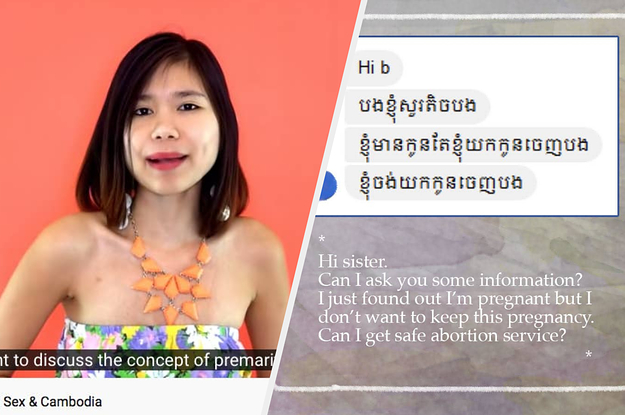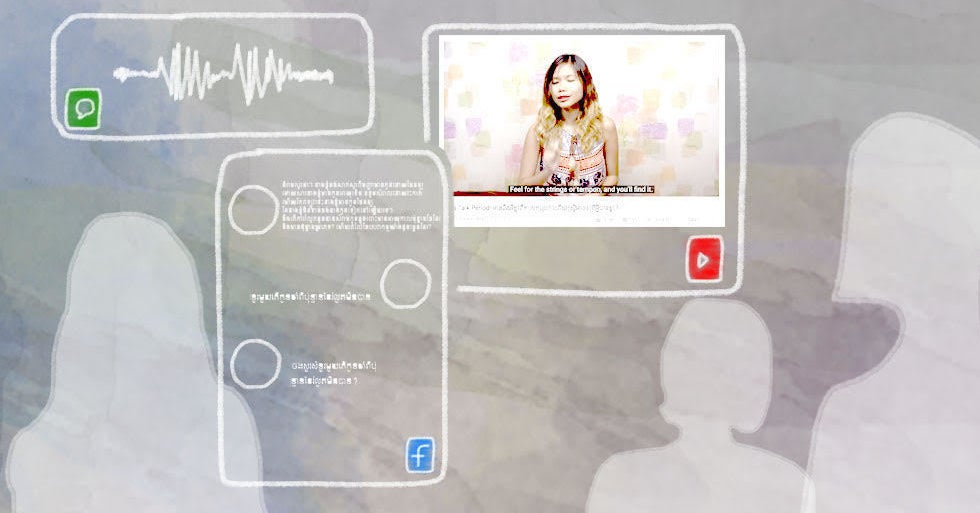

J, who lives in Cambodia’s southern province of Takeo, wasn’t sure who to turn to for advice on her unplanned pregnancy. She couldn’t afford to have another child, and knew she wanted an abortion.
“I felt afraid to discuss it with my family but I told my sister,” she told BuzzFeed News through an interpreter. “My husband supported my decision because our baby is one year and five months old, so we spend a lot of money already.”
“My friend had an abortion at a Marie Stopes clinic two or three years ago and she told me they provided safe abortion. I searched M-A-R using my friend’s Facebook page and then sent them a private message asking about safe abortion.”
In doing so, J became one of thousands of Cambodian women who have messaged Marie Stopes International, a non-government family planning organisation, on Facebook asking for advice. She asked that her full name not be used in this article, to protect her privacy.
A de-identified Facebook message sent to Marie Stopes.
“I didn’t want to call their number because I was worried someone would overhear me,” the 29-year-old said. “I felt comfortable because the counsellor said all my information would be private and wouldn’t be shared with anyone.”
Over Facebook, the counsellor gave J more information on getting an early medical abortion, and two weeks ago she went into a Marie Stopes clinic where she was prescribed mifepristone to terminate the pregnancy.
In 2018 1,514 Cambodian women messaged Marie Stopes on Facebook for help. Last year that figure rose to 3,127, said contact centre coordinator Sreyneath Buth.
Sreyneath Buth.
“We often get messages from our clients asking about safe abortion and at how many weeks they can have an abortion, and whether in the future they’ll be able to have a baby or not [after an abortion],” Buth told BuzzFeed News. “They ask about contraception and sexually transmitted infections (STIs), and mostly young people just asking about the emergency contraception pill.”
Buth says the messages often contain voice recordings “as it is faster and they don’t need to write”. Sometimes women who are concerned they have an STI send pictures of their discharge.
Facebook counsellors are trained in sexual and reproductive health and follow scripts “to make sure we are providing appropriate information”, Buth said. If women need to attend a clinic, the counsellor will help them make an appointment.
Staff at Marie Stopes Cambodia say many women don’t know that abortion is legal up until 12 weeks gestation. After that, a public health facility will approve and provide a termination only if it is needed to save the woman’s life or preserve her health, if the pregnancy is a result of rape, or if the foetus is diagnosed with an incurable disease.
Cambodia’s teen pregnancy rate has been steadily rising for more than a decade and a report by Save the Children found the number of Cambodian teenage girls who were pregnant had risen from 8% in 2010 to 12% in just four years.
“We have this young 16-year-old girl and she is already 12 weeks pregnant and didn’t know where to go or who to ask, but she was randomly scrolling through her Facebook and found us,” the organisation’s integrated marketing director Camille Tijamo told BuzzFeed News. “Our clinic could not provide the termination so we referred her to a public health facility and her mother went with her.”
Camille Tijamo.
Some women want to remain anonymous, Tijamo said.
“Some of them are creating a new account just to send us a message because you’ll see a random photo [as their profile picture] and then when we try to follow up it just says ‘Facebook user’,” she said.
The one-on-one conversations in Facebook Messenger have been crucial in assisting women to discreetly access safe abortions, Tijamo said, adding that clients can use Facebook’s appointment feature to pick a time to come into a clinic.
“Most of them are in a difficult position and really don’t know who they can talk to or confide in,” she said. “If they have someone to discuss this kind of issue with they feel relieved.”
Catherine Harry knows firsthand how much false information there is about contraception in Cambodia. When she was 18, she requested a hormonal intrauterine device (IUD) insertion at a Phnom Penh clinic.
Harry, who is a communications specialist at Marie Stopes, was told that because she had never been pregnant, her cervix was not big enough for the contraceptive — an excuse she would later find out was a myth. She was instead given a hormonal implant in her arm, but not before an “uncomfortable experience” answering intrusive questions about her personal life.
“I was asked whether I was married, whether my partner was a white male and when I would decide on having children in the future,” the now 25-year-old told BuzzFeed News.
Her next visit to the clinic was just as unpleasant: “I was asked about my age and I was asked whether I would have a child soon because I was getting to an age where women should have children. As someone who does not have any desire to have any children now or anytime in the future, I had to skirt around the question very uncomfortably and awkwardly.”
Catherine Harry.
Around this time Harry began vlogging on YouTube and Facebook about feminism and sexual and reproductive health on an account named A Dose of Cath.
“Mostly it was NGOs and not individuals who were doing awareness raising campaigns,” she said. “That was when I decided that I would speak up about the topics because they are important and yet, many people, especially young people, don’t know about them.
“[I vlog so that] women are not judged for their sexual health choices and they can get services free of judgement.”
Her followers watched her blossom into an active feminist in an outlet she said allowed her to “vent” her frustration and chat about everything from affirmative consent to bacterial vaginosis.
“I see female oppression happening every day and it gets under my skin,” she said. “Vlogging and speaking up about it is one way that I use in hope of seeing changes.”
In her videos Harry tries to bust many of the myths about contraception that prevail in Cambodia.
“The most famous one is that if you get contraception it will affect your ability to have children in the future,” she said.
Many women worry about how long-acting reversible contraception will disrupt their menstruation.
“In Cambodia we believe that menstrual blood is bad blood, so if you don’t menstruate then the bad blood will stay inside of your body, so when you get an implant and you don’t menstruate they say ‘what about all the bad blood in your body?’, and they feel a bit scared by that and put off,” Harry said. “There is a misconception that when you get an implant in your arm it will move around your body.”
Many Cambodians believe you should not have sex before marriage, Harry said: “Sometimes [Marie Stopes clients] will tell us that they are married so it doesn’t seem like they’ve had premarital sex.”
Conversations about abortion and unplanned pregnancy are difficult in Cambodia, she said: “Abortion comes with stigma in Cambodia just like in many places. We are a Buddhist country and people belive abortion is sinful and that it is murder. People don’t want to tell people that they have just had an abortion.”
Harry says she’s been called “every name under the sun” for talking about sexual and reproductive health.
“I have been slut-shamed, harassed, accused of even something as vile as beastiality, received rape threats, and been sexualized,” she said. “People have infringed on my private life, my personal information has been spread around to the point where I no longer accept interviews that are conducted at my house for fear of my own safety and privacy.”
But social media has allowed Harry to bypass “gatekeepers of traditional media” in Cambodia, who she says would “never have allowed” her content to be aired.
There are also other organisations working to get information out there.
International development organisation CARE Cambodia’s sexual and reproductive health and rights adviser Loretta Hoban said stubborn misconceptions meant most women were using condoms or the withdrawal method to prevent pregnancy.
“Almost all women in Cambodia know that long-term methods like the pill and IUD exist, but only one-third of married women are using these kinds of methods,” Hoban told BuzzFeed News.
Inaccurate information — like the myth that long-acting reversible contraception causes infertility — is passed down to women by their mothers, other relatives, and even medical professionals, particularly in rural areas, she said.
“Many young people don’t realise they can become pregnant when having sex for the first time,” she said.
CARE has been training health providers to meet the needs of young people, as well as garment factory workers, many of who struggle to afford private health and come from rural areas. “85% of women working in garment factories in Cambodia are of reproductive age, and 18% have had an abortion,” Hoban said.
Chat! Contraception screenshot.
Digital tools have been key in helping women delay or space out pregnancies, or access information about HIV. CARE’s initiative Chat! Contraception, aimed at factory workers, includes an app that gamifies the experience of learning about contraception.
“Mobile games are increasingly popular in Cambodia, and the app provides a fun and interactive way to learn about a topic that people are often shy to speak about,” Hoban said. “There is a video drama series, which is made in the style of the soap operas that are very popular in Cambodia. The characters are young factory workers navigating love and relationships, and their stories engage viewers emotionally while providing accurate and easy-to-understand information about contraception.”
Anonymised screenshots of messages sent to Marie Stopes Cambodia’s Facebook page provided to BuzzFeed News show the range of concerns for which women are seeking information and counselling. A woman who wants a pregnancy test at a clinic, as her at-home tests have given conflicting results; a woman who wants to know how soon after giving birth she can have an IUD inserted; a woman who has taken abortion pills and is worried that she hasn’t yet bled; a husband who wants to know at what gestation his wife could access a termination.
“Whenever people send us a message we always say ‘this is a safe space for you to ask questions’, and that your information is kept private and confidential,” Tijamo said. “We always say ‘we are providing you information, but at the end of the day it is your decision about what you’d like to do’.”●